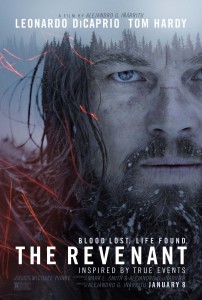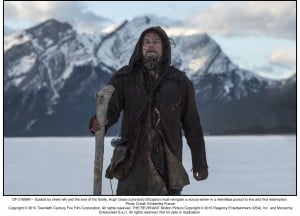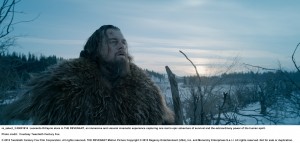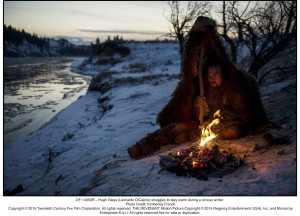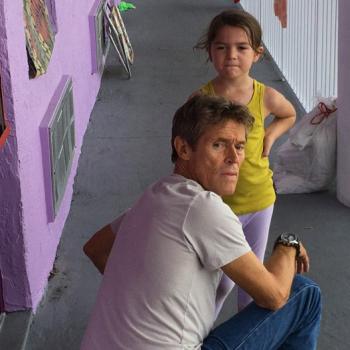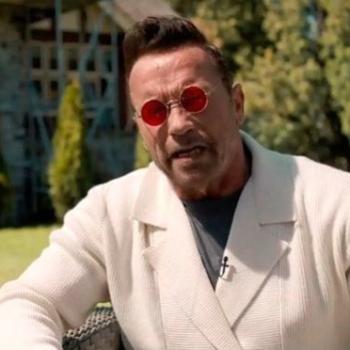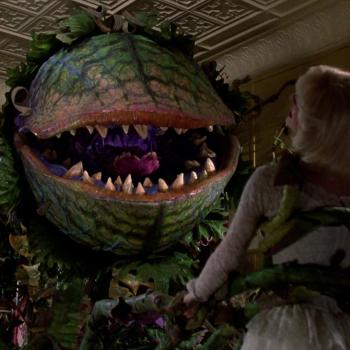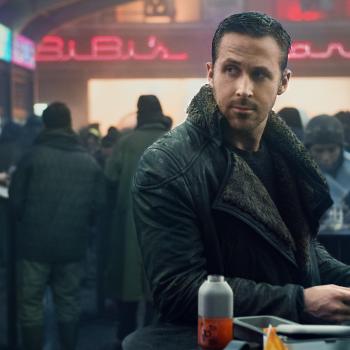We’re officially less than a month away from the Oscars. And while there’s definitely controversy this year that must be addressed, I find that I’m still excited for a month of talking about movies. So over the next few weeks, I’m going to take some time to talk about each of the nominees for Best Picture. As a reminder, the nominees are: The Revenant, Mad Max: Fury Road, Spotlight, The Martian, Bridge of Spies, Room, The Big Short and Brooklyn.
The Revenant
Nominations: 12 (Picture, director, actor, supporting actor, cinematography, costume design, sound editing, sound mixing, makeup and hairstyling, visual effects, film editing, and production design)
With a dozen nominations, “The Revenant” appears to be the film to beat this year. Critics groups and award bodies loved it, director Alejandro Gonzalez Inarritu is coming off a big win last year with “Birdman,” and enough has been written about the filming conditions that I’m surprised we haven’t seen a documentary called “The Passion of the Leo.”
On the surface, “The Revenant” looks and sounds like a winner. Emmanuel Lubezki’s cinematography is as gorgeous as I expected, using natural light to bring out the wilderness’ brutal beauty. Inarritu crafts some superb sequences, including a horrific bear attack and a massive battle sequence, both using long takes. And despite all the jokes about DiCaprio suffering for his art, he’s totally engaged here. “The Revenant” is a movie made by master craftsmen working at the peak of their skills.
So why was I nodding off every five minutes?
The truth is that for most of “The Revenant’s” two-and-a-half-hour runtime, I never cared about what was happening. I was dazzled by the camerawork, wowed by the scope and impressed at the way Leo screamed, spat and clawed his way across the forest. But the pretty pictures and intense performances never engaged me beyond the thought of “wow, that had to be a pain to pull off” or “hmm, he must have been freezing.” “The Revenant” often felt like a highlight reel of interminable length, trying to impress me with its craftsmanship but never making any attempt to hook me with its story or characters. It’s a doughnut — a lot of stuff surrounding an empty center.
The film’s problems can be seen with DiCaprio’s character. The film is centered on Hugh Glass and his attempts to get revenge on the man (Hardy) who left him for dead and murdered his son. And like I said, DiCaprio gives it his all. He’s tossed around like a rag doll, chokes up blood, vomits after eating a raw liver, spends extended time crawling or submerged in freezing water, and about 80 percent of his dialogue is “ungh, brgh, argh.” Glass is a man wracked with sorrow, seething with hatred and on the verge of death. DiCaprio, as always, throws everything into it.
But he’s failed by a screenplay that never tells us anything about Glass. We know he had a native American wife who was murdered. We know he’s mad about his son’s murder and sore about being left for dead because, well, who wouldn’t be? But aside from that, there’s nothing compelling about him. The film hints at mystical visions and dreams he might be having, such as an encounter in the ruins of a church. But they’re just pretty visuals that carry the sense of meaning without any weight. Is Glass struggling with faith in the midst of such a cruel world? We don’t know. Is he wrestling with the plight of the indigenous folk he lived among? The film pays lip-service to this idea but never explores it. Even Glass’s final revelations about revenge are cliche; when someone informs him that revenge won’t bring back his son, I almost threw up my hands. I waited two and a half hours for that old chestnut? And his final actions, meant to imply some sort of peace with God, are delivered not as a moment of character growth but as a sick joke, basically the frontier version of Batman telling Ra’s Al Ghul “I’m not going to kill you, but I don’t have to save you.” (Evan Cogswell pointed this out over at Looking Closer recently). The film is so intent on making us notice how great of an actor DiCaprio is that it never creates a character for him to bring to life, instead hoping that enough spittle and screaming will finally win him that Oscar.
His performance is indicative of the whole movie, which is just a collection of “look at me!” camera work and pretty shots of trees and snow. Lubezki’s cinematography is absolutely beautiful — filming in natural light gives the film a haunting, ethereal beauty. But I agree with Devin Faraci at birth.movies.death who noted in his review that those shots never carry real power because there’s no context or meaning to them:
You could walk in on any one scene of The Revenant and assume you’re watching a masterpiece; the cinematography from Emmanuel Lubezki (Chivo to his BFFs in awards punditry) is often stunning, and the frames are composed with a master’s confidence. But they don’t mean anything – a particularly gorgeous shot of Glass walking alone on a frozen river, flanked by great grey gloomy ridges of mountains makes for a fine image but imparts no new emotional information at that moment in the story. A great cinematic image is made up of more than composition and lighting, it’s made up of intrinsic contextual meaning.
It’s much of the same crap that Inarritu pulled with “Birdman.” The first time I saw that movie, I was taken in by its performances, cinematography and direction. I left feeling like I had seen the year’s best movie. It wasn’t until I stopped to think more it that I began to suspect the movie thought it was much smarter than it really was. On a second viewing, I realized just how confused and hollow its themes rang.
“The Revenant” is a better film than “Birdman” if only because it’s not as thematically confused; just thematically empty. Had this been just a straight revenge story or survival tale, I likely would have enjoyed it on those merits. But like with “Birdman,” Lubezski dresses up his empty movie with just enough surreal imagery and mystical hoo-haa to make you think you’re seeing something profound. And sure, shots of decrepit churches and vague allusions to leaving revenge in the Creator’s hands sound nice; but they have no root to the rest of the movie, acting as dressing to turn this from a pulp revenge tale into an Important Movie.
But people like flash and they like movies that feel important. So it’s not surprising to see that “The Revenant” is likely going to walk away with several awards. Some of them, it might even deserve. I don’t think Tom Hardy has a chance of upsetting Sylvester Stallone, but his work is the most compelling in the film. His character, Fitzgerald, is a nasty character and Hardy’s great. Will Poulter, as the young man who falls in with Fitzgerald and has to live with conflicted feelings after they leave Glass, is also really good. I wish the movie had given them more to do and dwelt more on their conflict.
As for the other awards, I feel it’s all great craftsmanship that fails in the attempt to make a great movie. The direction is strong but never creates a compelling story. The cinematography looks pretty but says nothing. DiCaprio works himself into a fervor but we never get a feel for who his character is. The film feels deep and profound in places, but it’s empty in the middle. Perhaps the reason some are finding meaning it it is because it’s easy to do that when you can affix whatever meaning you want to any scene because the director left all of it out. “The Revenant” is a movie of high craft and no soul.
“The Revenant” is now in theaters.

